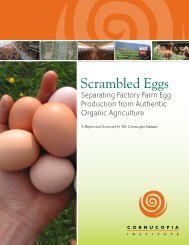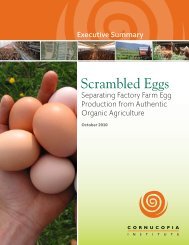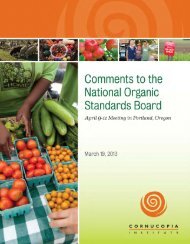“Behind the Bean” (pdf) - Cornucopia Institute
“Behind the Bean” (pdf) - Cornucopia Institute
“Behind the Bean” (pdf) - Cornucopia Institute
Create successful ePaper yourself
Turn your PDF publications into a flip-book with our unique Google optimized e-Paper software.
Silk appears to be moving away from<br />
supporting organic agriculture. Its<br />
familiar cartons no longer contain<br />
organic soymilk, but “natural”<br />
soymilk, with organic soymilk in<br />
a newly designed carton. Unlike<br />
“organic” claims, <strong>the</strong>re are no<br />
standards for “natural” farmers, and<br />
“natural” soybeans in Silk soymilk<br />
may be produced on monoculture<br />
farms, using inputs such as syn<strong>the</strong>tic<br />
fertilizers and pesticides that would<br />
be strictly prohibited in organic<br />
production.<br />
“We proposed to work diligently within <strong>the</strong> Kansas Organic Producers cooperative and partner with several o<strong>the</strong>r OFARM<br />
member cooperatives to supply superior quality beans with guarantees of being U.S. grown through <strong>the</strong> established organic<br />
audit trail process. While <strong>the</strong>y ‘talked <strong>the</strong> talk’ about purchasing <strong>the</strong> beans from U.S. producers, when <strong>the</strong> pricing structure<br />
was proposed to make <strong>the</strong> venture modestly profitable for <strong>the</strong> U.S. growers, <strong>the</strong> bottom line answer was that if we weren’t<br />
willing to provide <strong>the</strong> beans at a price equal to or less than <strong>the</strong> cost of available beans from China our proposal couldn’t be<br />
considered fur<strong>the</strong>r. End of negotiation.”<br />
Merle Kramer, a marketer for <strong>the</strong> Midwestern Organic Farmers Cooperative, observes, “Companies like White Wave had<br />
<strong>the</strong> opportunity to push organic and sustainable agriculture to incredible heights of production by working with North<br />
American farmers and traders to get more land in organic production, but what <strong>the</strong>y did was pit cheap foreign soybeans<br />
against <strong>the</strong> U.S. organic farmer, taking away any attraction for conventional farmers to make <strong>the</strong> move into sustainable<br />
agriculture.”<br />
Today, WhiteWave is moving away from using organic soybeans altoge<strong>the</strong>r, claiming that <strong>the</strong>re is an organic soybean shortage<br />
in <strong>the</strong> United States. It is clear, however, that WhiteWave is not an innocent victim of this shortage. Years ago, <strong>the</strong><br />
company had <strong>the</strong> opportunity to work with American farmers to convert farm acres to organic soybean production, but <strong>the</strong>y<br />
chose instead to source from China.<br />
Ironically, Dean Foods’ Silk brand is <strong>the</strong> marquee sponsor of <strong>the</strong> annual Farm Aid concerts—an event that purports to support<br />
family farmers and fight “factory farms.”<br />
Since Dean Foods acquired WhiteWave, its founder, Steve Demos, has left <strong>the</strong> company, along with almost all of <strong>the</strong> pioneering<br />
management—those who believed in “green” values. According to Demos, <strong>the</strong> company is now all about “green,<br />
with <strong>the</strong> dead presidents on it.” 59<br />
The <strong>Cornucopia</strong> <strong>Institute</strong>’s investment in <strong>the</strong> research behind this report, which has been widely known within <strong>the</strong> soy<br />
foods industry for <strong>the</strong> past year, might already have had, even before its release, an impact on American farmers and con-<br />
28 Behind <strong>the</strong> bean: The Heroes and Charlatans of <strong>the</strong> Natural and Organic Soy Foods Industry.





